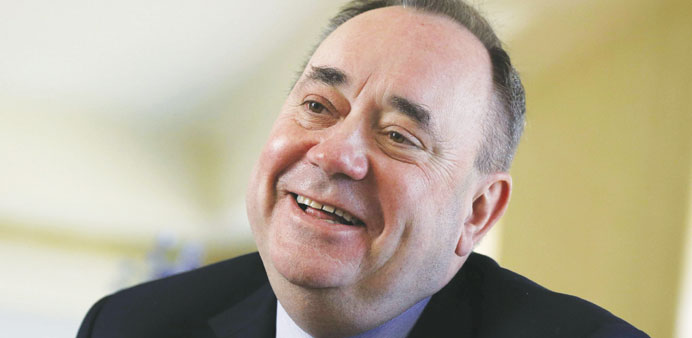Reuters/New York
Alex Salmond wants to see an independent Scotland free of submarines laden with nuclear missiles, but he says he is open to hosting Nato bases without weapons of mass destruction.
As leader of the Scottish National Party (SNP), which controls the Scottish parliament in Edinburgh, the Scottish first minister announced last month that on September 18, 2014, Scots would have a chance to decide whether or not to break from the United Kingdom after more than 300 years.
A Scotland free of British Trident nuclear submarines has been a long-standing aim of the SNP.
In an interview in New York, Salmond said he would not get into a debate before the referendum about allowing foreign military bases on Scottish soil. But he did say it was the SNP’s intention to be a Nato member.
“The choice in policy terms is to be a non-nuclear member of that organisation,” he said. “So then if we are talking about a non-nuclear base, then of course that would be something that would be possible in terms of the (Nato) treaty agreement.”
In February, the British government led by Conservative Prime Minister David Cameron warned in a legal opinion that an independent Scotland would forfeit its membership in international bodies such as Nato and the European Union.
Salmond said an application to join the EU would be one of his first acts after a successful referendum. He predicted EU entry for an independent Scotland in 2016.
Salmond is in the US to promote the independence cause and to drum up investment to bolster the economy of the 5.2mn strong Scottish nation. He will seek to promote a distinct foreign policy view when he visits Washington this week and meets with US lawmakers.
Salmond said neither he nor Washington had broached the subject of a US military base in Scotland, but the SNP had had discussions with US representatives about Nato membership.
Cameron visited Scotland last week and welcomed back the crew of a Trident submarine. He is at odds with some members of his own coalition government in saying that scaling back Britain’s nuclear deterrent would be unwise given potential threats from Iran and North Korea.
Salmond argues that Scotland’s annual contribution of £180mn to help maintain the submarines would be better spent elsewhere.
“I accept that cleaning up contaminated land is part of the responsibilities of government, but the most important step in decontaminating nuclear materials in Scotland is not to renew a nuclear missile system for the next half century,” he said.

